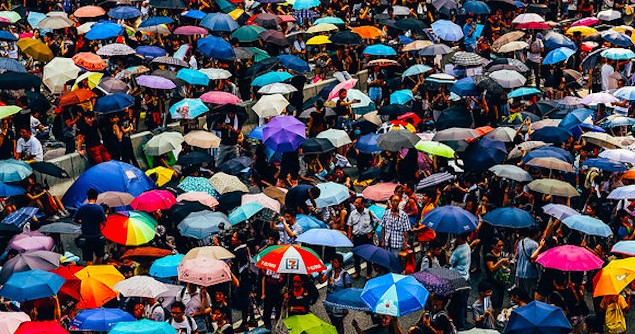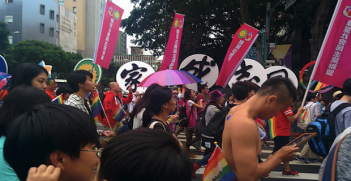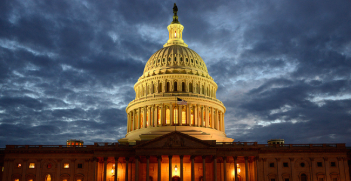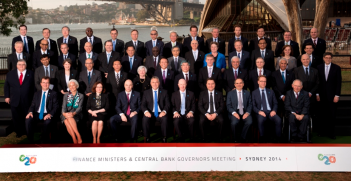Umbrella Revolution in Hong Kong

With Beijing declaring a 6 October ‘deadline’, Hong Kong’s Umbrella Revolution appears to have lost numbers. However, Chin Jin argues that, given the greater history of Hong Kong-Beijing relations, the protests will continue.
Hong Kong’s ‘Occupy Central with peace and love’, or the ‘Umbrella Revolution’, that has lasted for about ten days seems to have drawn the curtain for the time being. Despite several incidents of violence perpetrated by the Hong Kong police and unspecified thuggish acts orchestrated by Beijing, there has been no bloodbath nor casualties reminiscent of the 1989 Tiananmen Square Incident; not least due to Beijing’s self-restraint, but rather its political ploy. Indeed, if this is the end of the ‘Umbrella Revolution’, it means the Hong Kong civil protests have failed to achieve their fundamental quest for genuine universal suffrage while Beijing remains intact in the aftermath of a potential political crisis.
This was a zero-sum game, conveyed as a contest between a flock of sheep and a vicious beast. With an iron fist in its pocket against scattered sand of protests, Beijing has once again demonstrated its unswerving will to keep absolute power.
But the Occupy Central did not come out of the blue, nor will it die out as such. On the contrary, recent history suggests that the movement will revive.
According to the Joint Statement of China and the United Kingdom in 1984, Hong Kong would be handed over to the People’s Republic of China based on the principle of “one country, two systems”. Under this, Hong Kong would maintain its judicial independence under the British common law system and be administered according to the Hong Kong Basic Law, which guarantees the region a high degree of autonomy with restrictions only on diplomacy and defense. The Chinese government had also promised the democratic election of Hong Kong’s chief executive in 2017, as well as the general election of the Legislative Council in 2020.
Since then, Beijing has always been uncomfortable with this conditional trade-off; having annexed Hong Kong in return for its freedom of speech and associations, which is potentially a threat to the Beijing dictatorship. For Beijing, a democratic Hong Kong is an unanticipated problem. Given that its strategy of ensuring Hong Kong’s unyielding support for the Chinese Communist Party’s (CCP) leadership never materialised, Beijing could tolerate Hong Kong’s capitalist way of life but not its political democracy. However, the CCP has so far been able to exploit international appeasement as well as successfully warding off any possible threats a liberal Hong Kong could pose to Beijing.
It is increasingly evident that Beijing has no intention to keep its promises underlined in the Sino-British Joint Declaration and the people of Hong Kong are increasingly aware of its hidden strategy and undisclosed intentions. They also realise that citizens’ protests remain the only channel in which Hong Kong could enjoy democracy. As a result, the idea of Occupy Central with love and peace emerged in March 2013, designed to precede the 2017 election of the chief executive by universal suffrage consistent with accepted international standards.
It had been 18 months from the launch of the Occupy Central movement to the rally on 28 September 2014 in which Beijing deployed all its resources, ranging from violent crackdown to propaganda, to resist the popular uprising. Beijing led the Chinese population to believe and condemn the alleged covert manipulation of the “Umbrella Revolution” by both the US and the UK.
Given the history of externally financed revolutions (note the financial support of France, Netherlands and Spain for the American Revolution, the role of Japanese Yen in China’s own 1911 Revolution, Kaiser Wilhelm II’s 26 million Reichsmark to fund Russia’s October Revolution and Soviet assistance in 1949 Chinese Communist Revolution), this claim is not without precedent and has been an effective source of propaganda throughout the protests.
In perspective, Hong Kong’s Occupy Central looms as one of the biggest political struggles on record. Whatever its consequences, it is bound to go down in history. Past events show that Hong Kong people will continue their protests until their goals and aspirations are eventually met.
Chin Jin is Chair of the Federation For A Democratic China, Australia. He is an M.A. graduate of the University of Western Sydney. In June 2012, he set up the China Democracy Forum to observe and analyze the current political situation in China.





